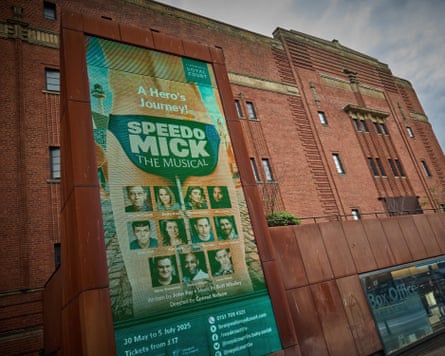When the lights went down on the final scene of Speedo Mick – the Musical, Michael Cullen had tears streaming down his face. He wasn’t the only one.
On the face of it, the show about his life, which opened at Liverpool’s Royal Court theatre this week and runs until July, is a knockabout romp about a local character known for raising money for charity by strutting his stuff in a pair of bright blue budgie-smugglers.
But it is also a story about addiction, depression and hitting rock bottom. It’s about finding purpose and becoming a hero, but losing yourself along the way. Fundamentally, says the 60-year-old the morning after its opening night, it’s a story about hope.
“It’s not happy-clappy,” says Cullen. “But it is funny. It’s got music, it’s got love, it’s got breakups. It’s got hope and perseverance and heart.”
In short, it tells Cullen’s extraordinary story with clear-eyed honesty. For 20 years of his life the Liverpudlian sank deep into addiction, abusing drugs and drink and ending up homeless. In 2001, with the help of a friend he credits with saving his life, he managed to get clean.
“When you’re wrapped up in addiction, you become a victim to your own circumstances,” he says. “You stop taking responsibility […] there’s a lot of shame and guilt. I’ve had to work hard to become the person I am today, who actually shows himself some compassion and love. I’ve had to rebuild life, one day at a time.”
Part of that rebuilding was the invention of Speedo Mick, a one-man fundraising machine, who carried out feats of endurance wearing Everton-branded Speedos and little else. In 2014 he swam the Channel, despite never having had a formal swimming lesson. After becoming attached to his bright blue trunks, the lifelong Evertonian started turning up half naked at Goodison Park on match days, cheerily shaking a charity bucket.

He was asked in those early days what he wanted to achieve: raise £1m was the answer. “People looked at me like I was nuts; I was dreaming too big for them,” he says. “But if your dreams don’t scare you, they’re not big enough. I love that saying.”
Then – with a wrecked shoulder and aching knee – he took his now-famous kecks on a series of monumental charity walks: from John o’Groats to Land’s End in 2020, a 2,000-mile Giving Back Tour in 2021, then up Ben Nevis, Snowdon and Scafell Pike in 2023. Occasionally, like when Storm Ciara nearly blew his trunks off, he donned an Everton scarf along with a swim cap and goggles.
In the process Cullen raised – and he has the precise figure – £1,036,000. But behind the celebratory news stories his life was beginning to fray at the edges. Without a manager and doing his own social media, he said yes to every request, on one occasion jumping on to a train to turn up in his Speedos at an Evertonian’s wedding.
Since recovering from addiction he had been searching for a purpose, and looking to pay back the people who had helped him survive, he explains. “I thought the purpose was to give and it is,” he says. “The giving back process is a beautiful thing. But you can’t draw from an empty well, and I was doing that for years. I found the purpose, and I lost myself.”
After his last walk – and months of hugs, cheers and beeping horns as he trudged on through the biting cold – he got home, and his mental health collapsed. His relationship broke down and he ended up in a clinic for six weeks.

It is a part of his story that the producers of the musical have not shied away from. The Liverpool actor Paul Duckworth has said the role explores Cullen’s complexities and vulnerability. The show’s writer, John Fay, told the BBC that while Speedo Mick seemed superhuman, Cullen wasn’t. Like all of us, he was fragile.
The theatre’s stated mission is to tell scouse stories with a scouse accent and Cullen is grateful his story is being told in his home town. “This is where I fell, and this is where I rose again,” he says, before laughing at himself for sounding “a bit Jesus Christy”. But he is also insistent that as well as his triumphs, it’s important to show audiences his darkest moments.
“You can’t just see me running around getting medals and being on the telly. It’s not going to inspire anybody, they’re not going to connect to it,” he says. “The connection is, hopefully, for everyone who hasn’t found recovery yet. We’re shouting from the rooftops that hope is there for you. If there’s hope for me, there’s hope for you.”
He insists that he is now taking greater care of himself. He struggled at school, and as an adult was diagnosed with attention deficit hyperactivity disorder, but he’s now training to be a counsellor (“I had a lot of fear going back into a classroom, but man! It’s been a delight.”) and is writing a book about his life.
The tears he shed on the opening night were also tears of pride and happiness at the love he felt surrounded by, he says. “I never get used to that. And it’s great that I don’t, because it’s brand new every time. I don’t take it for granted, the love and affection. It’s massive, man. It holds me.”
-
Until 5 July at the Royal Court theatre, Liverpool

 3 months ago
64
3 months ago
64

















































